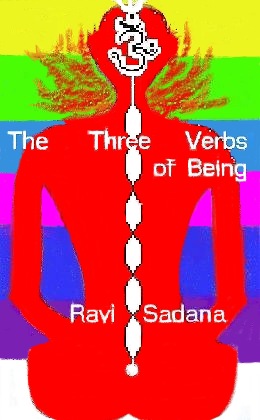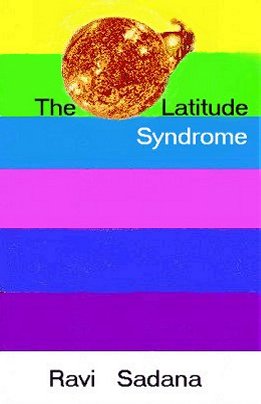Please note that the word "feminine" in the discussion has no gender significance. It is more along the essence of "life-forming, sustaining and nurturing".


|
Author Bio
Born in the upper reaches of the western Himalayas south of the Tibetan border, Ravi spent his childhood learning traditional wisdom from gurus and learned swamis in Simla, the summer capital of British India. His formal education lies in the disciplines of applied psychology, physics, mathematics and aeronautical engineering. He served for twenty-five years as Director of Information Sciences at The Clarke Institute of Psychiatry, University of Toronto, Toronto, Canada, where over one hundred research projects in the behavioral and neuropsychic sciences came to fruition. His lifelong passion has been the study of the human condition with an eye to the mystical and spiritual undercurrents. The musical outpourings of the Haydn-Mozart-Beethoven period have sustained him. |
The Latitude Syndrome
Intuitively, most men feel the presence of
spiritual energy all around them. They also know that women, by nature,
have a deeper connection with it than they do. And they endorse this virtue
whole-heartedly. Political, social and economic clouding of the issues
notwithstanding, man's unceasing fascination with the intrigue of woman throughout history
atests to this fact. The feminine nature of spirituality first disarms men. Then it charms them to
express their inner virility as their progeny. No matter what tactic or
social language man uses to attract a mate, his basic yearning is to be
awash in feminine spirituality, which finds expression through his mental
faculties, in most cases, conforming to the peer-denominated norms of the
particular culture. This fundamental yearning is dressed up with physical
and emotional language with which we are all too familiar. The popular
ritual, aka marriage, has been the raison d'etre for most, since day one of human existence
on the earth. But for those whom destiny has predisposed for the rarest
of miracles, the relationship can also be nurtured entirely on the spiritual
plane. This path requires special training, perseverence
and an irrevocable commitment that may even threaten their lives under certain
conditions. But the rewards cannot be imagined or described in any language.
They can only be experienced. More about that later.
I said 'spiritual primacy.'
The Three Verbs of Being explores the source of the universal feminine shakti or spiritual energy through the author's boyhood experiences from several angles.
 Early comments:
Early comments:
The setting is the seat of the nostalgic days of the Imperial British Raj, a gem of a Himalayan city called Simla in India. The timing is when the golden era was at its height of pre-war glory. Seen through the eyes of pubescence, the true tale paints events of a period covering thirty-five years but actually spanning two centuries! . . . mysticism woven into the role of the characters. Not much has been written on the topic of 'clairaudience', a telepathic phenomenon involving sounds. The author has drawn on its profound power to shed light on the themes of artistic creativity and extrabiological roots . . . a coming of age story binds the sibling topics of reincarnation, self-recognition and the mystery of the union of atma (Consciousness) with paramatma (Superconsciousness) . . .rich snapshots of family-life . . . the oozing nostalgia of the Raj. . . The British, bewildered by the mysticism of India . . .the Indians, mesmerized by the soft pale beauty . . . master-servant psychology . . .matchless settings for captivating drama . . . metaphysical dilemmas, revelations . . . the quest for the source of feminine spirituality and its ultimate triumphant grandeur.
Rashi, a spiritually gifted boy, begins his steam-rail journey and is fascinated with steam engine musicology as its sense-filled rhythms awaken his mind to the mysteries of nature. He takes to the British and a colony of rhesus monkeys around the temple on the Jakhu Mountain, where guru Ram Dave demonstrates his uncanny rapport with the monkeys. Episodes of clairaudience, family secrets and visions of soft beauty haunt him. Extrasensory experiences at the Tara Devi mountain confound him. Searching for his identity, he is absorbed by the female form. . . environment feeds him copious amounts of sensual material. . . begins to understand his biological roots. Adolescence lead him on to a search for his nonbiological blueprint. . . throwbacks and revelations take him to the source of the feminine energy in the universe.
Anecdotes and travelogues translate the esoteric metaphysical into day-to-day experiences.
Two teachers simplify the philosophy and the 'how-to' instruction for personal growth.
. . . . a special bond between the guru and Shona, the wife of a British officer. . . . Ram Dave and his monkeys transform Shona . . .the mysticism of conjugated Kundalini. . . the ultimate union in heavenly bliss.
Shona and Rashi become confidants and RD's pupils. They learn karma, dharma, meditation and the secrets of atma's union with paramatma for liberation from suffering. Together they discover the feminine origin of spirituality. A cobra teaches Rashi a lesson as Margaret's piano-playing leads him to his extrabiological roots in Salzburg while Shona ponders the mystery of clairaudience.
The guru talks about the model of human experiential evolution, Mental, Emotional and Spiritual verbs and the basis of artistic creativity in man.
Shona and Ram Dave pursue a conjugated Kundalini relationship as Shona is shunned by the British. An unusual relationship with Suvi puts him in touch with his emotional self. An affair with Toshi fizzles out but not before Rashi uncovers lactation . . . the roles of Mary Jane, Shona, Suvi and Toshi in his life . . . . three verbs of being. . . . comes to terms with himself, becoming the man he is, one verb at a time.
Rashi sets sail for Canada.
The reader will also enjoy:
The companion book, The Latitude Syndrome - for self-help and self-education - elaborates in simple text form on the metaphysical concepts put forth in The Three Verbs of Being. It is a collection of new thought articles, essays and scientific techniques for a satisfying lifestyle to manage the challenges of the new millennium. Themes emphasize the bases of physical, emotional, mental and spiritual health for a stressless response to problems.

Outline of The Latitude Syndrome
Generic recipe for dry legumes
The human skin
Gonadic Health and Ambience
The duality of the creation of the universe and man
Click here to
review samples of The Latitude Syndrome
Order directly from the US distributor.
UTP Group Inc.
2250 Military Road, Tonawanda, NY 14150
US and Canadian customers
Toll free in USA and Canada, tel: 1 800 565-9523; fax: 1 800 221-9985
By E-mail: utpbooks@utoronto.ca
Major charge cards are accepted for payment
CANADIAN ORDERS: Please note GST will be added to total charge
University of Toronto Press Toronto numbers, tel: 416 667-7791 fax: 416 667-7832
UK and continental European customers:
University of Toronto Press,
C/O Marston Book Services
PO BOX 269, Abingdon, Oxon, OX14 4SD
England
tel: (01235)465500; fax: (01235)465555
Thank you for your patience as the site is redesigned
- Visitor number:->